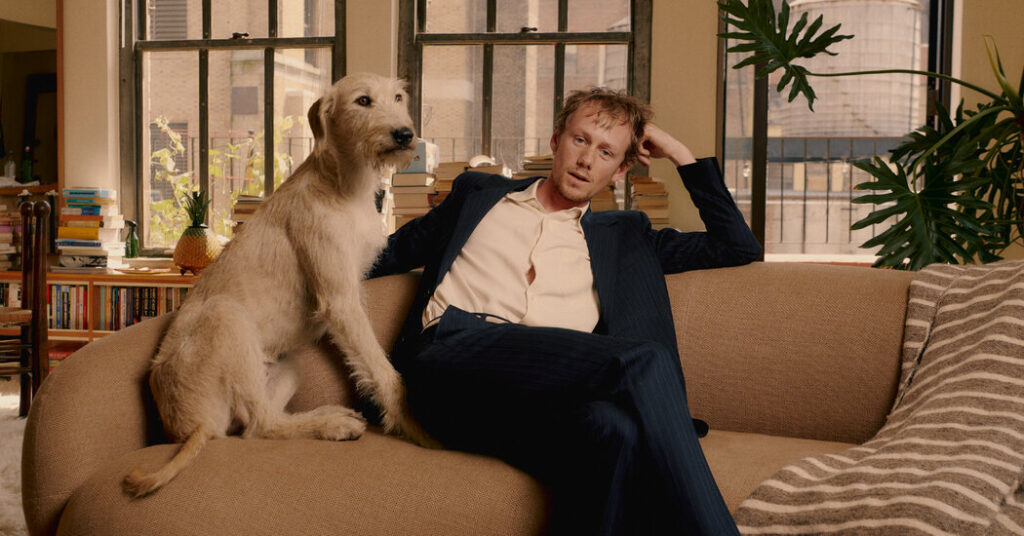Niclas Larsson, Film Director, Waits for Success in New York’s Garment District

If old age is not for snowflakes — well, try directing a 90-minute feature film about old age in the iPhone era, as Niclas Larsson has done.
Mr. Larsson, 33, greeted me on a recent morning into his 15th-floor terraced apartment in a former button factory in Manhattan, looking eerily like his dog, a blond lurcher named Ted, the way many owners do. He had settled here, the garment district of Midtown Manhattan, after rejecting “hipper” quarters in Brooklyn and the financial district.
A native Swede with a deep appreciation of Americana, he was offering strong black coffee and strong opinions on where his new movie, “Mother, Couch,” should be seen, like the Angelika theater downtown, where it opens on Friday, and the Nuart in Los Angeles.
“Hollywood is like, What’s going on?” Mr. Larsson said, considering the summer box office, which has thus far been a faint shadow of last year’s Barbenheimer. “No one knows what’s going on. But I want to give the nerds the option of going to the theater. It’s made for a theater. It’s shot on 35 — it’s all the film nerdy things in there.”
“You know what also about a theater that we forget is the God perspective of people telling us a story,” he went on. “People forget — the big shadow plays they did around the fires in the Stone Age? They did them large, because it’s important.”
“Mother, Couch,” based on “Mamma i soffa,” a 2020 Swedish novel by Jerker Virdborg, and shot to some local excitement in Charlotte, N.C., indeed takes on large themes, including mortality, parenthood and that Gen Z bugaboo, capitalism.
The story is focused on an elderly matriarch (Ellen Burstyn at 91: “the cutest, most beautiful lady,” Mr. Larsson said) who plunks down on a sofa at a furniture store and refuses to get up, causing her three adult children to rally around her in distress, if not consensus. The most agitated and involved of them — in the wilds of elder care, there’s always one — is played by Ewan McGregor. Lara Flynn Boyle, as his sister, and F. Murray Abraham, as the identical-twin owners of the store, also figure.
Mr. Larsson was fretting a little that, at the Toronto International Film Festival last September, some had suggested that “Mother, Couch” was a dramedy, an impression seemingly confirmed by a poster featuring Mr. McGregor as he looks winsomely heavenward. (The image has since been changed to something more surreal.)
“I’m like, ‘Guys, it’s horror — we did a mistake,’” he said (his excellent English is flecked with such occasional slight malapropisms). “If we lure the audience into believing that it’s a comedy, they’ll walk out. And they did, of course. Can you imagine? Poor people!”
Though the director whose career Mr. Larsson most covets is Billy Wilder’s, he saw plenty of horror movies as a child, including two starring Ms. Burstyn: “The Exorcist” (1973) and “Requiem for a Dream” (2000). He grew up on a farm near Malmo, often looked after by grandparents oblivious to the rating system, and he was about 8 when he watched Brad Pitt in “Seven.”
“That was a huge deal for me,” he said. “Like, what is this incredible force that comes from this screen? How can I feel this terrified?”
His mother worked long hours at a beauty salon, where he read a lot of celebrity gossip magazines, wondering, What do these people do? Why are they important? Why do people take pictures of them? He also fingered the hair-color samples. “Which I loved, because they had these beautiful little knots,” he said.
His father was a former military officer who sold charter tours and had a cool record collection. Little Niclas went on a TV talent show, “Little Stars,” and did an impression of Alice Cooper as he sang “School’s Out,” complete with a snake wrapped around him. He won.
He became a fairly successful child actor but soon realized you could have more fun behind the camera, controlling what people said. “I hated school,” he said. “I was sort of a loner, and sort of famous, and that was weird to deal with, and I was really bad, bad, a bad kid. Not violent, but I didn’t like the assignments. Like, for example, when we had Swedish class and were told to write a three-page story, I couldn’t understand why I couldn’t hand in 10 pages.”
Ingmar Bergman films weren’t doing it for him, either.
“Way more interesting to watch ‘Rambo,’ you know what I mean?”
Truck honks were wafting upstairs, but Ted had fallen asleep on a squishy couch, his paws twitchy as if he were galloping through a dream field. Mr. Larsson described his current reading material: “Burning Boy,” Paul Auster’s biography of Stephen Crane, and “Cinema Speculation” by Quentin Tarantino. (He also liked Andrew Lipstein’s recent novel about a finance-bro-gone-loco, “The Vegan.”)
He tried film school at the University of Southern California, where he bunked with a bunch of medical students who advised him to hop on a Hollywood tour bus for cultural immersion. “We pull up to Michael Jackson’s house, and the gate’s open, and there’s an ambulance,” he remembered. He snapped a photograph. Soon afterward, he continued, he walked into an H&M, where he saw a man crying. He recalled: “He’s like, ‘The king is dead, the king is dead!’ I was like, ‘What king? The Swedish king?’ And my frat guys are like, ‘You should sell that picture, you should sell it.’”
Fascinating as Los Angeles was, Mr. Larsson dropped out and moved back to Sweden, to Stockholm, and sold fish-oil supplements outside supermarkets. “The experience of talking to 300 people a day — in retrospect, that made me a director,” he said.
He worked on commercials, including one for Adidas starring Justin Bieber, and on a short called “Vatten” (“Water”), a sort of “Little Mermaid” in reverse, about a girl who falls in love with an underwater ghost in a swimming pool. It won awards.
For Vogue magazine, he directed two shorts starring the fellow Swede Alicia Vikander and Anna Wintour, borrowing the plot from the “Twilight Zone” episode titled “Nick of Time.”
“She’s like the last Andy Warhol,” Mr. Larsson said of Ms. Wintour. “That’s what’s left. Icons are slowing fading away — everything becomes boring and generic. It’s weird to be in a time where people care less and less about the craft of filmmaking and more about the instant click or whatever it is.”
But as his new movie opens, despite some gingerly early reviews, Mr. Larsson is remaining hopeful about the future of cinema, with his drawerful of scripts — “plenty, plenty, plenty” — and endless fascination with New York.
“It’s meth clinics and buttons, and that combination is fantastic,” he said of the faded-noir environs outside his big windows. “Like the other day I see this Maybach. It’s 6:30 in the morning, I’m walking him.” He gestured at Ted. “We’re talking a $350,000 car. There’s a 60-year-old guy in a million-dollar suit eating a kebab at the street corner between a flopping plastic scaffolding. I’m like, Where else in the world could I see that? I want to know his story.”
niclas-larsson-film-director-waits-for-success-in-new-yorks-garment-district





